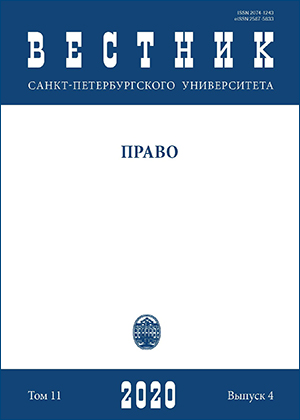Constitutional and legal regulation of the use of languages in multinational federations: Lessons from Belgium and India
DOI:
https://doi.org/10.21638/spbu14.2020.403Abstract
In the article, the key characteristics of the status of official languages, linguistic rights and guarantees in multinational federations are discussed. Unlike many nation-states where the constitutions proclaim a regime of monolingualism, multinational federations are always multilinguistic. The practice of federalism has developed various approaches to the choice and constitutional stipulation of the status of state (or official) languages of federations and their interrelation with official languages of sub-federal entities and other languages of ethnic groups living within the country. As material for a more in-depth analysis, the author has chosen two multinational federations — Belgium and India. These two federations use different constitutional models for regulating the use of languages which have evolved in different social, cultural, and historical contexts. Despite this, the experiences of these federations (even taking into consideration the significant differences between them) illustrate certain common features. In particular, the author, using comparative methodology, comes to the conclusion that if a state population is deeply divided along linguistic-territorial lines, it is likely that the initial attempt of a constitutional legislator to establish a monolinguistic constitutional regime would fail and lead to a deeper polarization and political conflicts. By analyzing the use of the English language in India and Belgium as well as its constitutional status, the author discusses the role of a politically neutral lingua franca as a medium in a multinational state. The author examines not only legal regulation concerning languages, but also the processes of the development of mechanisms of legal regulation and the social, political, and historical contexts of development.
Keywords:
state language, official language, linguistic rights, linguistic guarantees, multinational federation, multinational federalism, linguistic federalism
Downloads
References
Downloads
Published
How to Cite
Issue
Section
License
Articles of "Vestnik of Saint Petersburg University. Law" are open access distributed under the terms of the License Agreement with Saint Petersburg State University, which permits to the authors unrestricted distribution and self-archiving free of charge.






